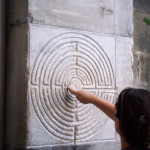We run our website the way we wished the whole internet worked: we provide high quality original content with no ads. We are funded solely by your direct support. Please consider supporting this project.
Open Theism: A Basic Introduction
On Monday and Tuesday, Greg explained Molinism and contrasted it against the open view of the future. (Click here for part 1). Because many see the open view as a limited view of God, it’s helpful to be clear that this has less to do with the nature of God and is about the nature of the future. In his book, Satan and the Problem of Evil, Greg explains the open view of the future in this way:
________________________
With the whole of the Christian tradition, [the open view of the future] affirms that God is omniscient, knowing the past, present and future perfectly. But it also affirms that the future decisions of self-determining agents are only possibilities until agents freely actualize them. In this view, therefore, the future is partly comprised of possibilities. And since God knows all things perfectly — just as they are, and not otherwise — God knows the future as partly comprised of possibilities.
The open view of the future thus affirms that in creating the world God faces the possibility, but not the certainty, that free creatures would choose to oppose him to the extent that they have. This view thereby allows us to consistently affirm that God entered into a somewhat risky endeavor in creating the world. … (91-92)
We might compare this view of God to a master chess player. We would ordinarily consider a chess player to be insecure to the extent that she would need to know ahead of time, or control if possible, all the moves of her opponent to ensure winning a match. Conversely, we would ordinarily consider a chess player wise and confident to the extent that she could ensure victory without relying on these aids. Her confidence is rooted in her ability to wisely anticipate all possible future moves her opponent might make together with all the possible responses she may make to each of these possible moves. She does not know exactly how many moves she will have to make, or what these moves will be, before the match begins, for she does not know exactly how her opponent will move his pieces. If her opponent is formidable, she may even have to place certain pieces “at risk” in order finally to checkmate him. But by virtue of her superior wisdom she is certain of victory. And precisely because her victory does not come from having a blueprint of her opponents moves or otherwise controlling her opponents moves, the wisdom she displays in achieving her victory is praiseworthy.
This is, of course, an analogy. In reality, no humans can come close to foreknowing every possible combination of moves they and their opponents might make throughout the course of every conceivable match. These possibilities do exist ahead of time, however, so the omniscient God of course perfectly knows them. Indeed, to apply the analogy to the real world, we must conceive of God foreknowing and perfectly anticipating from all eternity every possible event that might come to pass. For whatever in fact comes to pass was logically possible from all eternity. Consequently, God would eternally know it as such.
But this vast foreknowledge is of possibilities not of future certainties. God may (and does) sovereignly delimit these possibilities as he sees fit by decreeing the parameters within which free agents can make decisions. There is no “risk” he enters into that he himself did not choose. But in the open view of the future he does not restrict these possibilities to one certain course of action. While that would be a risk-free course of action, it would rule out freedom, which in turn would real rule out the possibility of love. (113-114)
Category: General
Tags: Foreknowledge, Open Theism, Satan and the Problem of Evil, Warfare Worldview
Topics: Open Theism
Related Reading

How do you respond to Romans 9?
The Deterministic Interpretation of Romans 9 Many people believe that Romans 9 demonstrates that God has the right and power to save whichever individuals he wants to save and damn whichever individuals he wants to damn. I’ll call this the “deterministic” reading of Romans 9, for it holds that God determines who will be saved…

What is the significance of 2 Kings 13:3–5?
The Lord judged the Israelites by allowing them to be oppressed by King Hazael of Aram (vs. 3). “But Jehoahaz entreated the Lord, and the Lord heeded him; for he saw the oppression of Israel, how the king of Aram oppressed them. Therefore the Lord gave Israel a savior, so that they escaped from the…

What is the significance of Jonah 1:2; 3:2, 4–10; 4:2?
God “changed his mind” (3:10) about the destruction he planned to carry out on Nineveh. If all events in history are eternally settled and known by God as such, his word to Jonah that he planned to destroy Nineveh in forty days was insincere as was his inspired testimony that he in fact changed his…

Why the 35W Bridge Collapsed – blog post 8/09/2007
As all of you know, I’m sure, a little over a week ago the 35W bridge in Minneapolis collapsed. This is the most traveled bridge in Minnesota. It was a tragedy, though the fact that only 13 people died and/or are presumed dead is really amazing, especially given that this happened at the peak of…

Problems with the Simple Foreknowledge View
Some have proposed a model of divine foreknowledge which allows them to avoid the dilemma of affirming either that God creates people for the purpose of sending them to hell (Calvinism) or that he creates them without certain knowledge of their fate (open theism). In this alternative view God knows that certain individuals will be…

What is the significance of Exodus 3:18–4:9?
The Lord tells Moses that the elders of Israel will heed his voice (vs. 18). Moses says, “suppose they do not believe me or listen to me…” (4:1). God performs a miracle “so that they may believe that the Lord…has appeared to you” (vs. 5). Moses remains unconvinced so the Lord performs a second miracle…

